Search Results
YMCA La Crosse Food Forest Guide
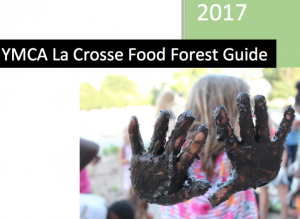 This guide was developed to aid in your creation of your very own food forest. The guidelines set forth in this document will assist you in the step by step creation of your own food forest. It does not matter if you choose to create a small forest at home or a large-scale community project, this guide is here to help. View Resource»
This guide was developed to aid in your creation of your very own food forest. The guidelines set forth in this document will assist you in the step by step creation of your own food forest. It does not matter if you choose to create a small forest at home or a large-scale community project, this guide is here to help. View Resource»
Wisconsin Vegetable Planting Calendar
 Knowing when to plant vegetables is important to the success of your garden. This Wisconsin vegetable planting calendar from Urban Farmer can help gardeners decide when and what to plant, starting the growing season off strong. View Resource »
Knowing when to plant vegetables is important to the success of your garden. This Wisconsin vegetable planting calendar from Urban Farmer can help gardeners decide when and what to plant, starting the growing season off strong. View Resource »
Top 12 Must-Have Herbs To Grow In Your Kitchen Garden
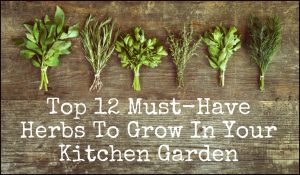 Herbs are a great way to get started. They can be grown in the classroom or outside and they make for fun taste and smell tests. Some of these herbs can be harvested, dried and stored. Others produce seeds that can be used as an additional spice. View Resource »
Herbs are a great way to get started. They can be grown in the classroom or outside and they make for fun taste and smell tests. Some of these herbs can be harvested, dried and stored. Others produce seeds that can be used as an additional spice. View Resource »
The USDA Farm to School Planning Toolkit
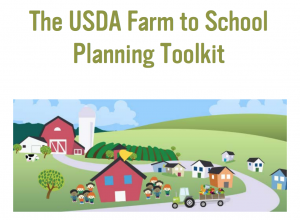 The Farm to School Planning Toolkit guides you though questions to consider and helpful resources to reference when starting or growing a farm to school program. It is designed for use by schools, school districts, and community partners. The toolkit is filled with tips and examples, insights from others, and lists of resources for further research. Each school district is unique, so browse the topics to find the resources most relevant to you and your implementation team! View Resource »
The Farm to School Planning Toolkit guides you though questions to consider and helpful resources to reference when starting or growing a farm to school program. It is designed for use by schools, school districts, and community partners. The toolkit is filled with tips and examples, insights from others, and lists of resources for further research. Each school district is unique, so browse the topics to find the resources most relevant to you and your implementation team! View Resource »
The School Garden Wizard
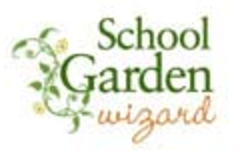 This page from Chicago Botanical Gardens covers a wide range of topics, including soliciting support, garden design, and teaching in the garden. View Resource »
This page from Chicago Botanical Gardens covers a wide range of topics, including soliciting support, garden design, and teaching in the garden. View Resource »
The Role of a School Garden Team
 A school garden team can serve essential needs in planning, establishing, and maintaining your garden program. But who should be on this team? Teachers? Administrators? Community members? Students? Yes, yes, yes, and yes! Learn more about forming a balanced garden team and the ways that the team can enhance garden-based education at your site. View Resource »
A school garden team can serve essential needs in planning, establishing, and maintaining your garden program. But who should be on this team? Teachers? Administrators? Community members? Students? Yes, yes, yes, and yes! Learn more about forming a balanced garden team and the ways that the team can enhance garden-based education at your site. View Resource »
Steps to a School Garden
 This website from the Collective School Garden Network has great resources for planning a garden, gaining community support, and implementing your plan, including lesson ideas and research on the benefits of garden-based education. View Resource »
This website from the Collective School Garden Network has great resources for planning a garden, gaining community support, and implementing your plan, including lesson ideas and research on the benefits of garden-based education. View Resource »
Sowing the Seeds of Success
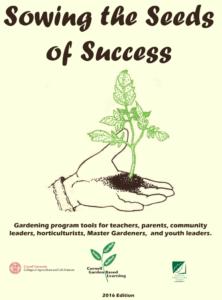 Designed in partnership with the American Horticultural Society, Cornell University’s Sowing the Seeds of Success is designed to walk you through the organizational aspects of a gardening program, including planning & organizing, benefits & research, fundraising & promotion, and evaluation. View Resource »
Designed in partnership with the American Horticultural Society, Cornell University’s Sowing the Seeds of Success is designed to walk you through the organizational aspects of a gardening program, including planning & organizing, benefits & research, fundraising & promotion, and evaluation. View Resource »
School Garden Calendar: Month-by-month Reminders & Suggestions
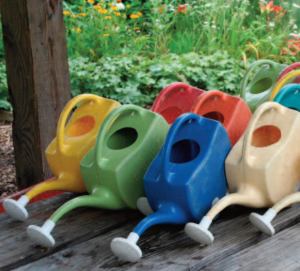 It can be hard to remember everything we need to prepare for spring. The New York Botanical Garden offers a calendar with reminders/suggestions to help you stay on top of your garden project year-round. View Resource »
It can be hard to remember everything we need to prepare for spring. The New York Botanical Garden offers a calendar with reminders/suggestions to help you stay on top of your garden project year-round. View Resource »
Roots in the Ground
Roots in the Ground is a comprehensive Farm to Early Care and Education (ECE) curriculum created by Rooted staff, partners, and consultants to guide in-person garden-based education and cooking trainings for ECE professionals. The curriculum is designed to help early childhood educators feel inspired and confident in gardening and cooking activities with young children. View Resource »
Role of the Garden Committee
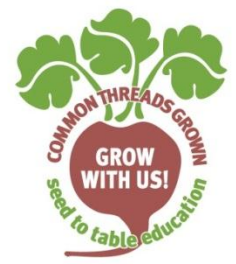 This resource will help you develop a plan and expectations for your garden committee. If you’re just getting started or looking to build support for your garden, a garden committee is a great way to bring together enthusiastic supporters who want to help your garden blossom. Gardens flourish when important stakeholders like teachers, parents, nurses, and students all have their voices heard. View Resource »
This resource will help you develop a plan and expectations for your garden committee. If you’re just getting started or looking to build support for your garden, a garden committee is a great way to bring together enthusiastic supporters who want to help your garden blossom. Gardens flourish when important stakeholders like teachers, parents, nurses, and students all have their voices heard. View Resource »
Planning Your School Garden
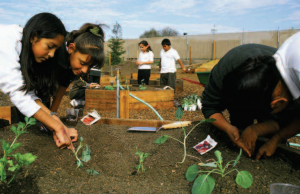 This resource will guide you through the basic steps of creating and maintaining a school garden, including: seeking administrative approval, creating a support network, identifying goals and linking the garden to your curriculum, designing the garden, identifying supply needs and funding needs, obtaining supplies and funds, planting the garden, maintaining the garden, and sustaining the garden. View Resource »
This resource will guide you through the basic steps of creating and maintaining a school garden, including: seeking administrative approval, creating a support network, identifying goals and linking the garden to your curriculum, designing the garden, identifying supply needs and funding needs, obtaining supplies and funds, planting the garden, maintaining the garden, and sustaining the garden. View Resource »
Plan For Success
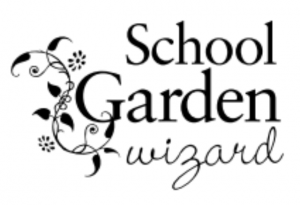 This is a go-to guide to help you plan your school garden. The document covers a variety of topics, including how to analyze your site, how to build a team around your school garden, and fundraising — including a sample fundraising letter. View Resource »
This is a go-to guide to help you plan your school garden. The document covers a variety of topics, including how to analyze your site, how to build a team around your school garden, and fundraising — including a sample fundraising letter. View Resource »
Outdoor Classrooms For School-Age Learners
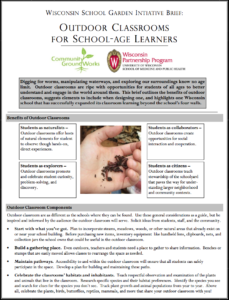 Digging for worms, manipulating waterways, and exploring our surroundings know no age limit. Outdoor classrooms are ripe with opportunities for students of all ages to better understand and engage in the world around them. This brief outlines the benefits of outdoor classrooms, suggests elements to include when designing one, and highlights one Wisconsin school that has successfully expanded its classroom learning beyond the school’s four walls. Download Brief »
Digging for worms, manipulating waterways, and exploring our surroundings know no age limit. Outdoor classrooms are ripe with opportunities for students of all ages to better understand and engage in the world around them. This brief outlines the benefits of outdoor classrooms, suggests elements to include when designing one, and highlights one Wisconsin school that has successfully expanded its classroom learning beyond the school’s four walls. Download Brief »
La Crosse Community Garden Toolkit
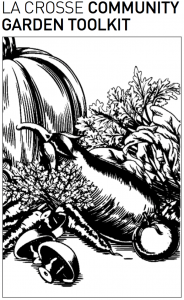 This comprehensive guide covers topics such as selecting a site, establishing a garden committee, securing funding, and building your garden. View Resource »
This comprehensive guide covers topics such as selecting a site, establishing a garden committee, securing funding, and building your garden. View Resource »
Home Gardening Guide for Your Family
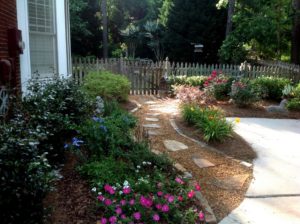 This website is a helpful guide for families looking to start a garden, and has links that will also be helpful for school garden programs, including articles on how to grow specific vegetables such as asparagus, corn, and cucumbers, as well as various kinds of fruit. View Resource »
This website is a helpful guide for families looking to start a garden, and has links that will also be helpful for school garden programs, including articles on how to grow specific vegetables such as asparagus, corn, and cucumbers, as well as various kinds of fruit. View Resource »
Growing School Gardens: Annie’s How-to Guide for Five Kinds of Children’s Gardens
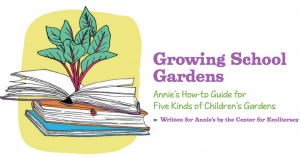 This guide offers five examples of different gardens—from simple to complex—that can flourish at schools and other learning environments with the hope that at least one of these examples will fuel your motivation to garden with kids: windowsill gardens, vertical gardens, raised beds/container gardens, cold frames/tunnels/greenhouses, and large-scale gardens. View Resource »
This guide offers five examples of different gardens—from simple to complex—that can flourish at schools and other learning environments with the hope that at least one of these examples will fuel your motivation to garden with kids: windowsill gardens, vertical gardens, raised beds/container gardens, cold frames/tunnels/greenhouses, and large-scale gardens. View Resource »
Growing Plants Indoors, On Balconies, and for Seniors & Those With Special Needs
 This handy reference tool will help you plan your garden and will server as a reminder that even the most experienced gardener has some plants die off, so don’t let perfect be the enemy of good. View Resource »
This handy reference tool will help you plan your garden and will server as a reminder that even the most experienced gardener has some plants die off, so don’t let perfect be the enemy of good. View Resource »
Gardening Mistakes That I’ve Made
 Here are 6 gardening mistakes from a real gardener (who will continue to make and learn from mistakes, as we all will)! Whether you are new to gardening or experienced, you will make some mistakes. Learn from it. That’s the most important thing. Your garden is not going to be perfect and there is nothing wrong with that. View Resource »
Here are 6 gardening mistakes from a real gardener (who will continue to make and learn from mistakes, as we all will)! Whether you are new to gardening or experienced, you will make some mistakes. Learn from it. That’s the most important thing. Your garden is not going to be perfect and there is nothing wrong with that. View Resource »
Gardening by Month
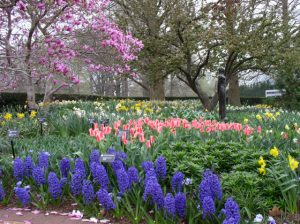 This list of “Monthly Tips and Tasks” from the Missouri Botanical Garden can help you plan weekly and monthly gardening tasks and help identify common pests and problems that occur each month. View Resource »
This list of “Monthly Tips and Tasks” from the Missouri Botanical Garden can help you plan weekly and monthly gardening tasks and help identify common pests and problems that occur each month. View Resource »
Free & Discounted Seeds for Youth Garden Programs
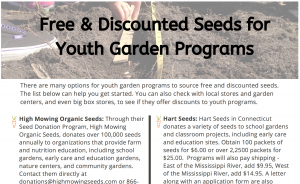 This document lists companies and organizations that provide free and/or discounted seeds for youth garden programs. This list is not specific to any state or region, so you may also want to check with local stores and organizations if you are looking to source seeds for your youth garden program. View Resource »
This document lists companies and organizations that provide free and/or discounted seeds for youth garden programs. This list is not specific to any state or region, so you may also want to check with local stores and organizations if you are looking to source seeds for your youth garden program. View Resource »
Forming a Garden Committee
 If you’re just getting started or looking to build support for your garden, a garden committee is a great way to bring together enthusiastic supporters who want to help your garden blossom. When forming your garden committee, think about a diversity of interests and perspectives. Gardens flourish when important stakeholders like teachers, parents, nurses, and students all have their voices heard. This is a guide to forming an effective garden committee from kidsgardening.org. View Resource »
If you’re just getting started or looking to build support for your garden, a garden committee is a great way to bring together enthusiastic supporters who want to help your garden blossom. When forming your garden committee, think about a diversity of interests and perspectives. Gardens flourish when important stakeholders like teachers, parents, nurses, and students all have their voices heard. This is a guide to forming an effective garden committee from kidsgardening.org. View Resource »
Fearless Beginning Gardening at Your Program
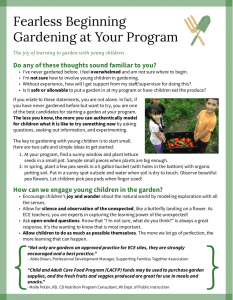 This resource is designed to remind you of your well-honed ability as an educator to learn new skills and share the experience with young children (in other words, you already have what it takes to do this!). Learn how to start small, engage children in the garden successfully, and also how to tackle any problem that may arise and turn it into a learning opportunity. This resource is funded by the W.K. Kellogg Foundation of Battle Creek, Michigan. View Resource »
This resource is designed to remind you of your well-honed ability as an educator to learn new skills and share the experience with young children (in other words, you already have what it takes to do this!). Learn how to start small, engage children in the garden successfully, and also how to tackle any problem that may arise and turn it into a learning opportunity. This resource is funded by the W.K. Kellogg Foundation of Battle Creek, Michigan. View Resource »
Cultivating Childhood Wellness Through Gardening
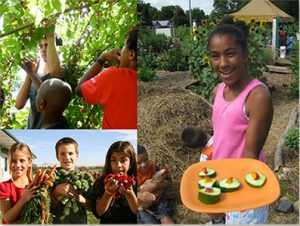 A free online training for K-12 teachers, early childcare professionals, and community educators. Topics cover garden planning, activities, and curricula. The entire training takes about 90 minutes, but can be viewed in separate chapters. Early childhood educators and some after-school program staff can earn 1.5 CEUs through The Registry. View Resource »
A free online training for K-12 teachers, early childcare professionals, and community educators. Topics cover garden planning, activities, and curricula. The entire training takes about 90 minutes, but can be viewed in separate chapters. Early childhood educators and some after-school program staff can earn 1.5 CEUs through The Registry. View Resource »
Creating and Sustaining Your School Garden
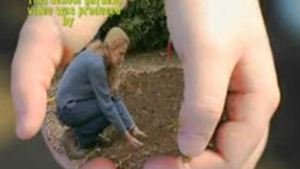 Life Lab has put together these helpful video lessons on creating and sustaining school gardens, covering topics like garden themes, composting, weeds, and irrigation. View Resource »
Life Lab has put together these helpful video lessons on creating and sustaining school gardens, covering topics like garden themes, composting, weeds, and irrigation. View Resource »
Creating & Growing Edible Schoolyards
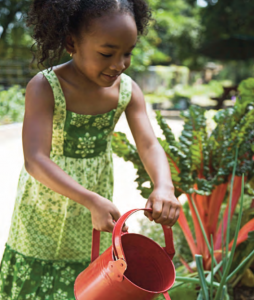 An edible schoolyard is a great tool to provide real-life experiences and to help students make the connection of how vegetables and fruit move from the seed to table. Developed as part of the Minnesota Statewide Health Improvement Program Initiative, this guide walks through developing a school garden as a key strategy to creating healthier schools. View Resource »
An edible schoolyard is a great tool to provide real-life experiences and to help students make the connection of how vegetables and fruit move from the seed to table. Developed as part of the Minnesota Statewide Health Improvement Program Initiative, this guide walks through developing a school garden as a key strategy to creating healthier schools. View Resource »
Building Your Own Home Garden
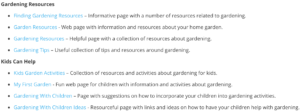 Certainly relevant to school gardens, too, this site features dozens of resources on topics ranging from managing fruit trees to choosing plants to getting kids involved. View Resource »
Certainly relevant to school gardens, too, this site features dozens of resources on topics ranging from managing fruit trees to choosing plants to getting kids involved. View Resource »
Advice to a New Gardener
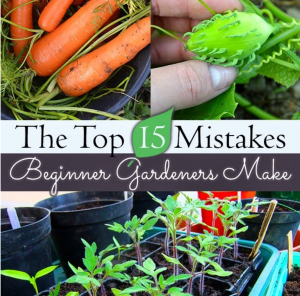 This blog post tackles some of the reasons that gardeners get burned out on gardening before they even get started. While the post focuses on individuals, many of the lessons can be applied to school garden settings. View Resource »
This blog post tackles some of the reasons that gardeners get burned out on gardening before they even get started. While the post focuses on individuals, many of the lessons can be applied to school garden settings. View Resource »
15 Mistakes that Beginner Gardeners Make
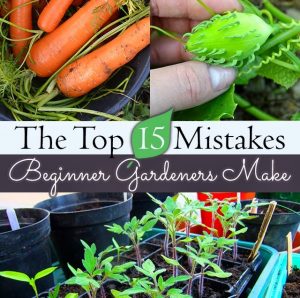 This blog post tackles some of the reasons that gardeners get burned out on gardening before they even get started. While the post focuses on individuals, many of the lessons can be applied to school garden settings. View Resource »
This blog post tackles some of the reasons that gardeners get burned out on gardening before they even get started. While the post focuses on individuals, many of the lessons can be applied to school garden settings. View Resource »

